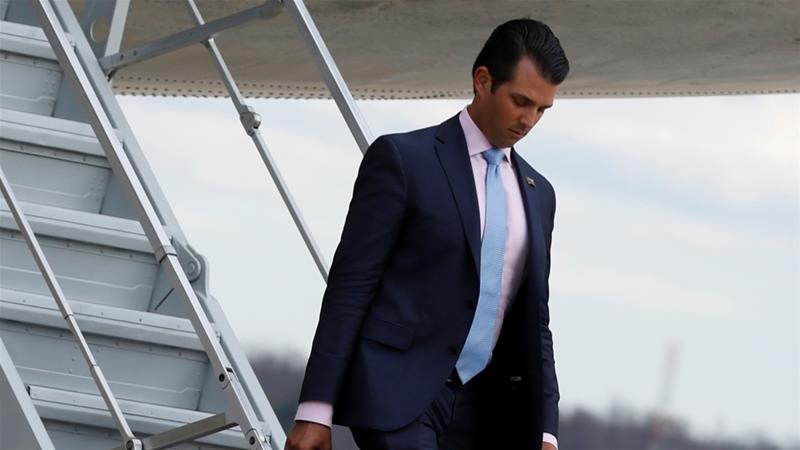There is a discussion on pages 185-188 of the Mueller Report on the factors that led the Office of Special Counsel to conclude that they should not prosecute anyone for setting up or attending the infamous June 9, 2016 Trump Tower meeting.
They begin by acknowledging that the meeting could be construed to violate 52U.S.C.§3012l(a)(l)(A), a federal statute that bans political contributions and donations by foreign nationals. However, a variety a factors make it a hard case to prove. One is that it’s difficult to assess the value of information, and there’s a threshold of value that must be met for an exchange to constitute a violation. Another is that the violation must be willful in the sense that people knew what they were doing was a crime. The Special Counsel’s office was unable to determine (using admissible evidence) that any of the participants were cognizant of the law when they took the meeting with the Russians.
There was plenty of evidence that they understood they may have committed a crime a year after the fact when news of the meeting was reported in the New York Times. But that implicates different statutes dealing with perjury and obstruction of justice.
In one sense, anyone who is familiar with the facts surrounding the Trump Tower meeting understands that it was inappropriate. The president certainly understood this, which is why he and Vladimir Putin sat down together in Munich and concocted a cover story about adoptions. I don’t think any fair-minded person believes that the participants have been exonerated in any moral sense. But we do have to accept that the Office of Special Counsel declined to bring any charges.
Having said that, many people still think it’s important to know if Trump was aware of the meeting prior to it taking place. They think it’s important to know the precise period in time when he became aware of the meeting because he has denied knowing about it until shortly before the story broke in the press. If you look at page 118 of the Mueller Report, you’ll see that Trump submitted a written answer under oath to Robert Mueller in which he repeated these denials. On page 429, you can read this answer for yourself.
For a long time there was speculation that some blocked numbers in Donald Trump Jr.’s call records might have been to or from his father, which would have strongly indicated that he had told his father in real time that he had set the meeting for June 9th. It turned out that the calls were with other people, and so there hasn’t been any strong evidence to date that Trump lied about his knowledge of the meeting either before or after the fact.
Michael Cohen told Mueller’s investigators that he believes Trump Jr. informed his father of the meeting in his presence, but he’s not certain. Rick Gates testified that Don Jr. talked openly about the meeting in a staff meeting, but Trump Sr. did not attend that staff meeting. Several people, including Cohen in sworn testimony and Steve Bannon, have stated that it’s unthinkable that Don Jr. would set up such a meeting without getting permission from his father ahead of time. None of this was enough to establish that the president lied to Mueller.
Now some people are saying that Trump inadvertently admitted that he knew about the meeting while speaking extemporaneously in the Rose Garden on Wednesday.
Here is what he said:
“You heard so much talk about phone calls made that my son made to me from this meeting…For a year I heard about phone calls…Of the three calls, that were so horrible, that he had a meeting and he called me, and then he had the meeting after and he made two more calls…”
To be clear, Trump is denying that any of these three calls were actually made, and the records at the relevant time would back up the claim that he Don Jr. did not call him at the time of maximum suspicion. Trump’s wording is jumbled so its hard to match what he said to a strict timeline, but he’s not saying that he was called from the meeting itself. He’s responding to what was alleged.
There were accusations that Donald Jr. called him before and after the meeting. A report Senator Feinstein put out last year highlighted a call Don Jr. had with a blocked number two hours after the meeting ended. We now know that call was not with his father.
If you want Trump held accountable for conspiring with the Russians, you won’t help the cause by spreading debunked disinformation. No one who knows both Trump and his namesake believes that the president told the truth to the Special Counsel, but Trump’s awkward statement in the Rose Garden is not proof of this.
Maybe the proof will emerge someday, but the fact that they went to such great lengths to deny the nature of this meeting shows that they understood they were in the wrong and guilty of something. Maybe the meeting itself was hard to charge as a crime. Maybe obstruction of justice was hard to prove. Maybe the president’s lies are difficult to establish beyond a reasonable doubt. Maybe the president cannot be charged with a crime so he cannot even be accused of a crime.
We all know what happened, though. We know that they eagerly accepted help from the Russians. We know that they tried to cover it up and called it a hoax. We don’t need to make unsupportable allegations when the plain facts are damning enough by themselves.



